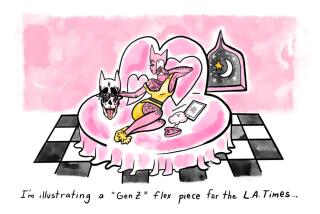Are 18-49ers really worth the wooing?
- Share via
THIS is not a new story, but it is a continuing one.
For a decade or more, whenever I read an article about television ratings that references the 18-49 demographic, that reference is inevitably followed by the phrase “the group most coveted by advertisers.” Google all the articles discussing the 18-49 demographic and I promise you, every one will include the now-wearisome clarification “the group most coveted by advertisers” or “the demographic advertisers drool over” or something of that nature. Check it out. It’s always in there. Every time.
Message to media writers: We got it. Advertisers like the 18-49 demographic. More than “like,” more than “love” even, they covet it. To me, “covet” sparks visions of crazed zealots pursuing an age group with wild-eyed fanaticism -- “We want those people!!!” It sounds unhealthy. Check the Ten Commandments on “coveting.” They’re not in favor.
Let us stipulate: It is not in dispute that advertisers covet the 18-49 demographic. The reason I know this, besides the fact that I’m continually reminded of it, is that the consequences of that coveting saturate the airwaves. Shows, commercials, programming decisions of all kinds reflect this demographic obsession. Everything is for them. Which, of course, makes sense.
Because advertising pays the bills, networks naturally want to keep advertisers happy. So they give them what they know they want: 18-49-targeted programming that will draw the “most coveted” to the advertisers’ commercials.
But accepting the advertisers’ coveting of the 18-49 demographic jumps over the question of “Why?” What’s so special about these guys that they find themselves in this enviable position? Why is this age group accorded such unilateral consideration, to the near exclusion of everyone else?
Conventional wisdom suggests the 18-49 demographic is coveted because its members are hip, cool and trendy, or aspire to be, which makes them ready targets for advertisers who, with the help of their products, promise that that’s what you’ll be. The right soda will make you popular, the right car will get you women, and the right beer might get you twins.
The 18-49ers are still young enough to care about being popular (and to believe that the right products can bring this about). They’re also open to trying new things, presumably too young to have tried old things.
And so a selected demographic becomes “the only people who count,” skewing all mass entertainment their way. The networks’ job, through appealing programming, is to bring these “most coveted” to one place. The advertisers’ job, through seductive button-pushing, is to reel them in.
Problems, however, exist. Beyond the question of whether the most coveted have substantial money to buy things with, there’s the question of whether they retain an interest in watching television at all.
Consider the competition: Going out. Surfing the Web. Checking your cellphone for missed calls, and calling them back. Edging up the demographic ladder, there’s working long hours, hands-on parenting and falling asleep exhausted. Augmenting the problem is their comfort with TiVo-type technologies that allow them to breeze past commercial blocks in seconds.
Against this is television, especially network television, with its plummeting viewership. There’s clearly trouble there. Yet advertisers continue to pour money into the medium as though TV is still the hottest show in town. Not that television’s totally “gone fishin’.” People still watch it. But are they members of the most coveted demographic? Or are they -- just a thought here -- their parents?
It’s almost impossible to get anyone to revisit conventional wisdom, but maybe it’s time advertisers took a deep, relaxing breath and a careful second look. It’s possible they’re coveting a demographic that’s strapped for cash and not watching much television. And ignoring one, with cash, that is.
More to Read
The complete guide to home viewing
Get Screen Gab for everything about the TV shows and streaming movies everyone’s talking about.
You may occasionally receive promotional content from the Los Angeles Times.






